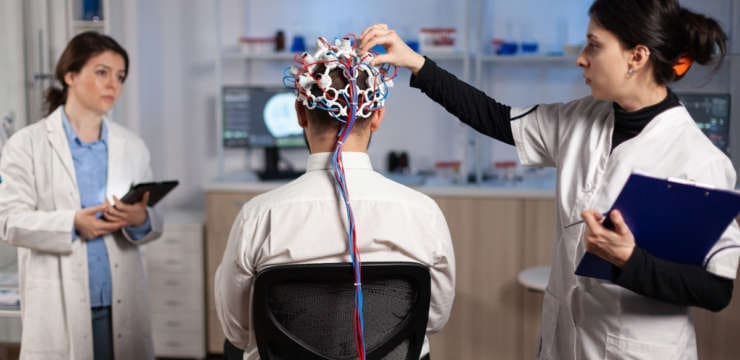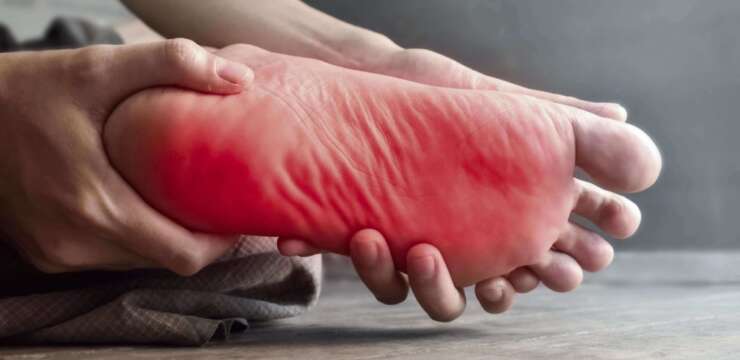
Nutritional guidelines for head injuries are essential for recovery. Discover the foods that support healing and overall well-being.
Table of Contents
Introduction
TBI, or traumatic brain injury, is a serious health problem that affects a lot of people all over the world. It occurs when a sudden hit or jolt to the head alters how the brain functions. This can occur due to falls, car accidents, sports, or other similar activities. We’ll discuss what TBI is, its associated symptoms (such as nausea), and how it affects a person’s eating habits and thought processes in this article. We’ll also discuss how certain foods, vitamins, and supplements can support brain health and promote healing. We’ll also provide you with easy recipes that can help support your nervous system. We’ll discuss treatment options that support the body’s natural healing process, drawing on insights from experts like Dr. Alexander Jimenez. This guide provides valuable information to help you, whether you have TBI or simply want to learn more about brain health.
There are millions of cases of TBI every year, and it’s becoming more of a problem. If not handled properly, it can cause problems for a long time. However, recovery can improve if you know how to eat and take care of yourself. Let’s get into the specifics.
What is Traumatic Brain Injury?
An external force hurts the brain, which is what causes traumatic brain injury. This force could be a bump, a blow, or an injury that occurs when something is struck. The brain is inside the skull and is protected by fluid. However, a strong hit can cause it to bounce or twist, which can damage it. Some TBIs are mild, like a concussion, while others are more serious and could lead to coma or death. Someone with mild TBI might feel dazed or pass out for a short time. In serious cases, there may be bleeding, bruising, or torn brain tissue. Research indicates that traumatic brain injury (TBI) is a significant contributor to disability and mortality worldwide, particularly in low- and middle-income nations where road accidents frequently occur (Maas et al., 2022). Older people are more likely to fall, while younger people are more likely to get TBIs from sports or car accidents. The brain is responsible for everything, from thoughts and feelings to movement. When it gets hurt, it can swell up, which puts more pressure on the inside of the skull. This swelling can also hurt healthy parts of the brain. Doctors use tools like MRIs and CT scans to detect damage. Blood tests for biomarkers can also help doctors determine the cause of mild cases without the need for immediate scans.
TBI isn’t just a problem right now; it can last for a long time. It makes it more likely that you will get diseases like Alzheimer’s later in life. Wearing helmets while playing sports or seatbelts while driving are two important ways to avoid accidents. However, when a TBI occurs, it’s crucial to receive treatment promptly. This includes rest, pain medication, and therapy to help you regain your skills. Studies show that TBI affects many parts of the body. For instance, it can mess with hormones or give you headaches that won’t go away. In a study, researchers observed that even mild traumatic brain injuries (TBIs) can result in incomplete recovery in 50% of patients after six months (Maas et al., 2022). Knowing about TBI can help you spot signs early and get help. Different people have different effects from TBI. Some people recover completely, while others must live with changes for the rest of their lives. Age and health are two things that matter. Older people often do worse because they have other health problems. Children may struggle with learning, but their brains are better equipped to adapt. In general, TBI is complicated. It’s more than just a head injury; it changes a lot of things in life. Learning about it helps people who are affected get better care and support.
Common Symptoms of TBI, Including Nausea
After the injury, symptoms of TBI may show up right away or a few days later. It all depends on the severity of the brain injury and its location. Headaches, confusion, and dizziness are among the most common symptoms. Nausea is a common sign, and it often happens when the brain’s balance center is affected. After a TBI, nausea can feel like having an upset stomach or wanting to throw up. It can happen because the brain swells or its chemical balance changes. In serious cases, it may indicate that there is increased pressure inside the skull. Research indicates that gut-brain connections are significant, as stress in the brain can influence digestion (Clark et al., 2016). This can make it difficult to eat, which can lead to weight loss or dehydration. Fatigue, characterized by a person feeling tired all the time, is another sign. It’s also common to have memory problems, trouble focusing, and mood swings like irritability or depression. You may experience issues with your senses, such as blurry vision or ringing in your ears. In mild TBI, these symptoms typically resolve within a few weeks, but in severe cases, they may persist for longer.
Another problem is trouble sleeping. Some people sleep too much, while others can’t sleep at all. This makes other symptoms worse. Weakness in the arms or legs or trouble with coordination are some physical signs. Some people can have seizures. Resting and avoiding things that trigger nausea, such as bright lights, can help alleviate symptoms. However, if it persists, you may need to consult a doctor. Studies on the gut-brain axis indicate that dietary modifications may be beneficial, as gut health affects brain recovery (Toader et al., 2024). It’s important to keep track of your symptoms. Doctors can change treatment based on what you write in your journal. Family support is also important because patients may not notice changes on their own. To sum up, nausea and other TBI symptoms demonstrate the connection between the brain and body. Better care comes from finding things early.
How TBI Affects Nutritional Habits
Eating habits often change after a TBI. The injury can make it difficult to plan meals due to memory problems. When you’re tired, you might skip meals, which can result in inadequate nutrition. Some people avoid eating because they feel unwell or due to the side effects of their medication. Changes in taste and smell are common, which makes food less appealing. It’s not good for you to add more salt or sugar. If you forget to drink, you can get dehydrated, which can make headaches or constipation worse (Headway, n.d.).
TBI can make it harder to swallow, which raises the risk of choking. This means that people can only eat soft foods, which limits their options. You can gain or lose weight. Some people eat too much to feel better, while others lose weight because they don’t eat enough. After an injury, you need more nutrients to heal. However, bad habits can prolong the healing process. Research indicates that high-fat diets exacerbate cerebral damage, whereas balanced diets mitigate it (Gómez-Pinilla, 2008). Planning helps: set alarms for meals and use easy recipes. Getting help from dietitians is helpful. They create plans that cater to the needs of people with TBI, such as incorporating more protein for tissue repair. In short, TBI makes it challenging to eat, but there are ways to ensure you get enough nutrition to help you heal faster.
The Impact of TBI on Cognitive Function
Cognitive function means thinking skills like memory, attention, and problem-solving. TBI often impairs these. Mild cases might cause short-term fog, severe ones long-term deficits. Memory loss is common; people forget recent events or struggle learning new things. Attention spans shorten, making focus hard. This affects work or daily tasks. Decision-making suffers too. Impulsivity or slow processing can occur. Emotions tie in; anxiety or depression worsens cognition. Research links TBI to lower BDNF levels, a protein for brain health. Diets rich in omega-3s can help restore this (Gómez-Pinilla & Kostenkova, 2008). Exercise also boosts BDNF, aiding recovery. Long-term, TBI raises dementia risk. But therapy like cognitive training helps rebuild skills. Overall, TBI’s cognitive impact varies, but support improves outcomes.
The Non-Surgical Approach to Wellness with Chiropractic Care- Video
Nutritional Foods, Vitamins, and Supplements for Brain Health
Good nutrition supports brain recovery after TBI. Certain foods, vitamins, and supplements reduce inflammation, protect cells, and boost function. Omega-3 fatty acids, found in fish like salmon, help reduce damage and improve cognition. DHA, a type of omega-3, maintains brain cell membranes (Gómez-Pinilla, 2008). Eat oily fish twice a week or take supplements. Antioxidants in berries fight oxidative stress, a TBI issue. Blueberries promote memory and learning (Gómez-Pinilla, 2008). Whole grains provide steady energy, helping fatigue. Nuts and seeds offer vitamin E, protecting against cell damage (Gómez-Pinilla, 2008). Vitamins like B-complex (B6, B12, folate) support nerve health. Low levels link to cognitive decline; supplements help (Gómez-Pinilla, 2008). Vitamin D preserves cognition in older adults. Supplements: Creatine aids energy supply, improving cognition in low-creatine states like TBI (Roschel et al., 2021). Curcumin from turmeric reduces inflammation. Probiotics support gut-brain axis, potentially easing mood issues (Cerdó et al., 2017). A Mediterranean diet with fruits, veggies, and healthy fats is ideal (Headway, n.d.). Consult doctors before supplements. These choices can enhance recovery and brain power.
Easy Recipes to Boost Your Neurological System
Try these simple recipes packed with brain-boosting nutrients.
- Omega-3 Salmon Salad: Grill salmon, mix with greens, nuts, and olive oil dressing. Serves 2, ready in 20 minutes.
- Berry Antioxidant Smoothie: Blend blueberries, spinach, yogurt, and flaxseeds. Quick breakfast.
- Turmeric Golden Milk: Heat milk with turmeric, ginger, and honey. Calms inflammation.
- Nutty Whole Grain Bowl: Cook quinoa, add veggies, nuts, and avocado.
- Veggie Stir-Fry with Tofu: Stir-fry broccoli, peppers, and tofu in olive oil.
These use foods like omega-3s and antioxidants for neurological support.
Insights from Dr. Alexander Jimenez on Treating TBI and Related Injuries
Dr. Alexander Jimenez, a chiropractor and nurse practitioner in El Paso, offers valuable insights on injury care. With credentials like DC, APRN, and FNP-BC, he combines chiropractic and medical approaches (Jimenez, n.d.a). (Jimenez, n.d.b). His clinic treats injuries from work, sports, personal, and MVAs, including TBI elements in neuromusculoskeletal care. Dual-scope diagnosis evaluates both physical and emotional factors using advanced imaging and diagnostic tests. Treatments include adjustments, exercise, massage, and acupuncture to promote natural healing and prevent long-term issues. For MVAs, quick care addresses whiplash. Integrative medicine targets the root causes, enhancing health through a combination of nutrition and therapy. Dr. Jimenez’s work shows how holistic care aids recovery.
An Example of A TBI Symptom Questionnaire:
 Conclusion
Conclusion
A traumatic brain injury (TBI) can change everything about your life, from how you feel sick and tired to how you think and eat. However, as we’ve seen, learning can help you improve. You can help yourself heal by identifying symptoms early, incorporating foods rich in omega-3s, antioxidants, and supplements, and trying easy recipes that are beneficial for your brain. Experts like Dr. Alexander Jimenez demonstrate the effectiveness of integrative approaches. These approaches combine chiropractic care, targeted exercises, and natural therapies to address the root causes and prevent problems from recurring.
Keep in mind that recovering from a TBI is a journey, not a race. A balanced diet boosts brain function and helps you get stronger, and professional help makes sure you get the right treatment for injuries from accidents, sports, or everyday mishaps. If you have a TBI or are helping someone else with one, be sure to focus on holistic health strategies that will support your long-term well-being. To get better results, stay informed, eat well, and get help from qualified providers. Your brain is very good at adapting and growing. Start now to make tomorrow healthier.
References
- Cerdó, T., Ruiz, A., Suárez, A., & Campoy, C. (2017). Probiotic, prebiotic, and brain development
- Clark, A., et al. (2016). Exercise-induced stress behavior, gut-microbiota-brain axis, and diet: a systematic review for athletes
- Conti, F., et al. (2024). Mitigating traumatic brain injury: A narrative review of supplementation and dietary protocols
- Gómez-Pinilla, F. (2008). Brain foods: the effects of nutrients on brain function
- Gómez-Pinilla, F., & Kostenkova, K. (2008). The influence of diet and physical activity on brain repair and neurosurgical outcome
- Headway. (n.d.). Diet after brain injury: Healthy body, healthy mind?
- Jimenez, A. (n.d.a). Injury Specialists
- Jimenez, A. (n.d.b). Dr. Alexander Jimenez, DC, APRN, FNP-BC, IFMCP, CFMP, ATN ?www.linkedin.com/in/dralexjimenez/
- Maas, A. I. R., et al. (2022). Traumatic brain injury: progress and challenges in prevention, clinical care, and research
- Meeusen, R., et al. (2018). Nutritional supplements and the brain
- Roschel, H., et al. (2021). Creatine supplementation and brain health
- Toader, C., et al. (2024). Mind, mood, and microbiota-gut-brain axis in psychiatric disorders
Disclaimers
Professional Scope of Practice *
The information herein on "Nutritional Guidelines to Consider to Prevent Head Injuries" is not intended to replace a one-on-one relationship with a qualified health care professional or licensed physician and is not medical advice. We encourage you to make healthcare decisions based on your research and partnership with a qualified healthcare professional.
Blog Information & Scope Discussions
Welcome to El Paso's wellness blog, where Dr. Alex Jimenez, DC, FNP-C, a board-certified Family Practice Nurse Practitioner (FNP-C) and Chiropractor (DC), presents insights on how our team is dedicated to holistic healing and personalized care. Our practice aligns with evidence-based treatment protocols inspired by integrative medicine principles, similar to those found on dralexjimenez.com, focusing on restoring health naturally for patients of all ages.
Our areas of chiropractic practice include Wellness & Nutrition, Chronic Pain, Personal Injury, Auto Accident Care, Work Injuries, Back Injury, Low Back Pain, Neck Pain, Migraine Headaches, Sports Injuries, Severe Sciatica, Scoliosis, Complex Herniated Discs, Fibromyalgia, Chronic Pain, Complex Injuries, Stress Management, Functional Medicine Treatments, and in-scope care protocols.
Our information scope is limited to chiropractic, musculoskeletal, physical medicine, wellness, contributing etiological viscerosomatic disturbances within clinical presentations, associated somato-visceral reflex clinical dynamics, subluxation complexes, sensitive health issues, and functional medicine articles, topics, and discussions.
We provide and present clinical collaboration with specialists from various disciplines. Each specialist is governed by their professional scope of practice and their jurisdiction of licensure. We use functional health & wellness protocols to treat and support care for the injuries or disorders of the musculoskeletal system.
Our videos, posts, topics, subjects, and insights cover clinical matters, issues, and topics that relate to and directly or indirectly support our clinical scope of practice.*
Our office has reasonably attempted to provide supportive citations and has identified the relevant research studies or studies supporting our posts. We provide copies of supporting research studies available to regulatory boards and the public upon request.
We understand that we cover matters that require an additional explanation of how they may assist in a particular care plan or treatment protocol; therefore, to discuss the subject matter above further, please feel free to ask Dr. Alex Jimenez, DC, APRN, FNP-BC, or contact us at 915-850-0900.
We are here to help you and your family.
Blessings
Dr. Alex Jimenez DC, MSACP, APRN, FNP-BC*, CCST, IFMCP, CFMP, ATN
email: coach@elpasofunctionalmedicine.com
Licensed as a Doctor of Chiropractic (DC) in Texas & New Mexico*
Texas DC License # TX5807
New Mexico DC License # NM-DC2182
Licensed as a Registered Nurse (RN*) in Texas & Multistate
Texas RN License # 1191402
ANCC FNP-BC: Board Certified Nurse Practitioner*
Compact Status: Multi-State License: Authorized to Practice in 40 States*
Graduate with Honors: ICHS: MSN-FNP (Family Nurse Practitioner Program)
Degree Granted. Master's in Family Practice MSN Diploma (Cum Laude)
Dr. Alex Jimenez, DC, APRN, FNP-BC*, CFMP, IFMCP, ATN, CCST
My Digital Business Card

 Conclusion
Conclusion




